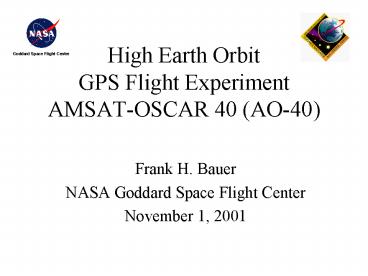High Earth Orbit GPS Flight Experiment AMSAT-OSCAR 40 (AO-40) - PowerPoint PPT Presentation
Title:
High Earth Orbit GPS Flight Experiment AMSAT-OSCAR 40 (AO-40)
Description:
This level of error could simply be the error in the TLE-based ephemeris itself. ... GEODE orbits will be differenced against each other and the TLE ephemeris. ... – PowerPoint PPT presentation
Number of Views:21
Avg rating:3.0/5.0
Title: High Earth Orbit GPS Flight Experiment AMSAT-OSCAR 40 (AO-40)
1
High Earth OrbitGPS Flight ExperimentAMSAT-OSCAR
40 (AO-40)
- Frank H. Bauer
- NASA Goddard Space Flight Center
- November 1, 2001
2
AMSAT Phase 3D (AO-40)
- Experiment Objectives
- Long term, real time attitude and orbit
determination experiment - Mapping the GPS constellation antenna patterns
above the constellation - Understanding the robustness and limitations of
using GPS above the constellation - Team
- AMSAT, NASA GSFC
- GPS Hardware
- 2 Trimble Tans Vector Receivers
- 4 patch antennas on perigee side of spacecraft
- 4 high gain (10 dB) antennas on apogee side of
spacecraft
AMSAT Phase 3D in Kourou
Launch November 16, 2000 Vehicle Ariane
5 Orbit 1000 by 58,800 km, i6
3
GPS Receiver (1 of 2) in Phase 3Ds Equipment Bay
Perigee Antenna (1 of 4)
Apogee Antenna (1 of 4)
4
Apogee Side of Spacecraft
5
AO-40 Orbit
a 36286.409 km e 0.796838 i 6.04 deg W 151.818
deg w 335.84 deg M 2.00 deg Rate of right asc
-0.208 deg/day hp 1000 km ha 58800
km Period 19.1 hours Epoch doy 278.71185185,
GPStime 1134,493517.0 UTCtime 2001-10-05,
170504
6
AO-40 Orbit with Geosynchronous GPS Orbits
Superimposed
7
AO-40 Attitude wrt GPS Orbit
w 5.4 rpm
8
Current Status
- First data retrieved on Sept 25, 2001
- AO-40 represents first long-term HEO GPS
experimentdaily results - Producing more data than expectedhighly likely
tracking more satellites than shown due to gaps
in data files - Expect to continue to retrieve first phase of
data through November - Experiment will revolutionize the use of
spaceborne GPS---new facet to support autonomous
navigation and formation flying in HEO/GEO
9
Lots of data is being collected
High SNRs during peripapse passes
High density of contacts near perigee passes
enhance likelihood of fitting an accurate orbit
to the data
Numerous contacts between high SNR regions
indicate high alititude contacts
10
October 6, 2001 Data Near Apogee
11
(No Transcript)
12
(No Transcript)
13
Spin Rate Effects on SNR
14
Point solutions may be possible when 3-axis
stabilized
Four or more simultaneous GPS satellites
15
Close-up of multiple track overlap window
Signals are fading as fourth PRN is acquired
Approximately 5 minutes of four satellite tracking
16
Orbit Determination
- Some cases near perigee, four satellites were
tracked simultaneously. - Point solution computed using the data collected
during perigee pass on Oct 5th. Difference
between this point solution and the state
computed from two line elements is 120 km
primarily in the along track direction. This
level of error could simply be the error in the
TLE-based ephemeris itself. - Point solution being used as initial guess to
process the complete data set in Microcosm (a
batch filter) and GEODE (a sequential filter).
The Microcosm and GEODE orbits will be
differenced against each other and the TLE
ephemeris.
17
main lobe tracking
side lobe tracking
signal obstructed by the Earth
18
Future Steps
- Data returned from AO-40 will enable further
characterization of GPS signal characteristics at
high altitudes, and provides an opportunity to
demonstrate orbit determination in a highly
eccentric orbit using only observations from a
low-cost GPS sensor - Lessons learned from AO-40 GPS experiment are
guiding future HEO GPS efforts at GSFC - PiVoT GPS receiver incorporates optimized
algorithms and satellite selection logic for HEO - PiVoT will be capable of tracking all satellites
in view and computing a real-time orbit solution
in the AMSAT orbit - GSFC AMSAT interested in follow-on experiment
opportunitycould develop s/c GPS receiver - Would like to partner on follow-on
experiment---looking for small s/c launch
opportunity































